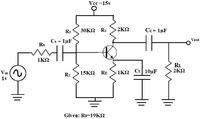anuragmash
Junior Member level 1
I don't know when to use a capacitor and an inductor in a circuit? I do know that capacitor impedes any change in voltage and inductor impedes any change in current. Using this information I am again confused because in a capacitor if there is a voltage spike in the power supply the energy is stored in the plates of the capacitor and then this extra energy will get discharged thus nullifying the job done by the capacitor. Similiarly with inductor because any change in the current is stored in the magnetic field as voltage the job is again nullified... Please help!!! Also why do we use coupling capacitors in ac transistor circuits???

